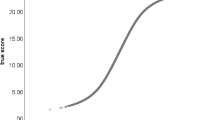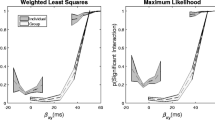Abstract
Tversky and Koehler's support theory attempts to explain why probability judgments are affected by the manner in which formally similar events are described. Support theory suggests that as the explicitness of a description increases, an event will be judged to be more likely. In the present experiment, experienced decision-makers from large, international accounting firms were given case-specific information about an audit client and asked to provide a series of judgments regarding the perceived likelihood of events. Unpacking a hypothesis into four formally equivalent hypotheses more than doubled its perceived likelihood. These results are largely consistent with support theory, extending its generalizability to applied contexts involving business professionals. Further, the paper finds that task-specific factors, a previously untested area, can also affect support theory interpretations.
Similar content being viewed by others
References
Asare, S. and Wright, A. (1995), Normative and substantive expertise in multiple hypotheses evaluation, Organizational Behavior and Human Decision Processes 64, 171–184.
Asare, S. and Wright, A. (1997), Evaluation of competing hypotheses in auditing, Auditing, A Journal of Theory and Practice 16, 1–13.
Ayton, P. (1997), How to be incoherent and seductive, Bookmakers' odds and support theory, Organizational Behavior and Human Decision Processes 72, 99–115.
Bedard, J. and Biggs, S. (1991), Processes of pattern recognition and hypothesis generation in analytical review, The Accounting Review 66, 622–642.
Fischhoff, B., Slovic, P. and Lichtenstein, S. (1978), Fault trees: Sensitivity of estimated failure probabilities to problem representation, Journal of Experimental Psychology: Human Perception and Performance 4, 330–344.
Fox, C. R., Rogers, B. and Tversky, A. (1996), Options traders exhibit subadditive decision weights, Journal of Risk and Uncertainty 13, 5–17.
Gavanski, I. and Hui, C. (1992), Natural sample spaces and uncertain belief, Journal of Personality and Social Psychology (November), 766–780.
Heiman, V. (1990), Auditors' assessments of likelihood explanations during analytical review. The Accounting Review 65, 875–890.
Libby, R. (1985), Availability and the generation of hypotheses in analytical review, Journal of Accounting Research 23, 648–667.
Nelson, M., Libby, R. and Bonner, S. (1995), Knowledge structures and the estimation of conditional probabilities in audit planning, The Accounting Review 70, 27–47.
Redelmeier, D., Koehler, D. J., Liberman, V. and Tversky, A. (1995), Probability judgment in medicine: Discounting unspecified possibilities, Medical Decision Making 15, 227–230.
Sherman, S., McMullen, M. and Gavanski, I. (1992), Natural sample spaces and the inversion of conditional judgments, Journal of Experimental Social Psychology 28, 401–421.
Smith, J. and Kida, T. (1991), Heuristics and biases: Expertise and task realism in auditing, Psychological Bulletin 109, 472–489.
Teigen, K. (1983), Studies in subjective probability III: The unimportance of alternatives, Scandinavian Journal of Psychology 24, 97–105.
Teigen, K. (1988), When are low-probability events judged to be ‘probable’? Effects of outcome-set characteristics on verbal probability estimates, Acta Psychologia 68, 157–174.
Tversky, A. and Fox, C. (1995), Weighing risk and uncertainty, Psychological Review 102, 269–283.
Tversky, A. and Koehler, D. (1994), Support theory: A nonextensional representation of subjective probability, Psychological Review 101(4), 547–567.
Wallsten, T. S., Budescu, D. A. and Zwick, R. (1992), Comparing the calibration and coherence of numerical and verbal probability judgments, Management Science 39, 176–190.
Windschitl, P. (2000), The binary additivity of subjective probability does not indicate the binary complementarity of perceived certainty, Organizational Behavior and Human Decision Processes 81, 195–225.
Author information
Authors and Affiliations
Rights and permissions
About this article
Cite this article
Brody, R.G., Coulter, J.M. & Daneshfar, A. Auditor Probability Judgments: Discounting Unspecified Possibilities. Theory and Decision 54, 85–104 (2003). https://doi.org/10.1023/A:1026243725082
Issue Date:
DOI: https://doi.org/10.1023/A:1026243725082




